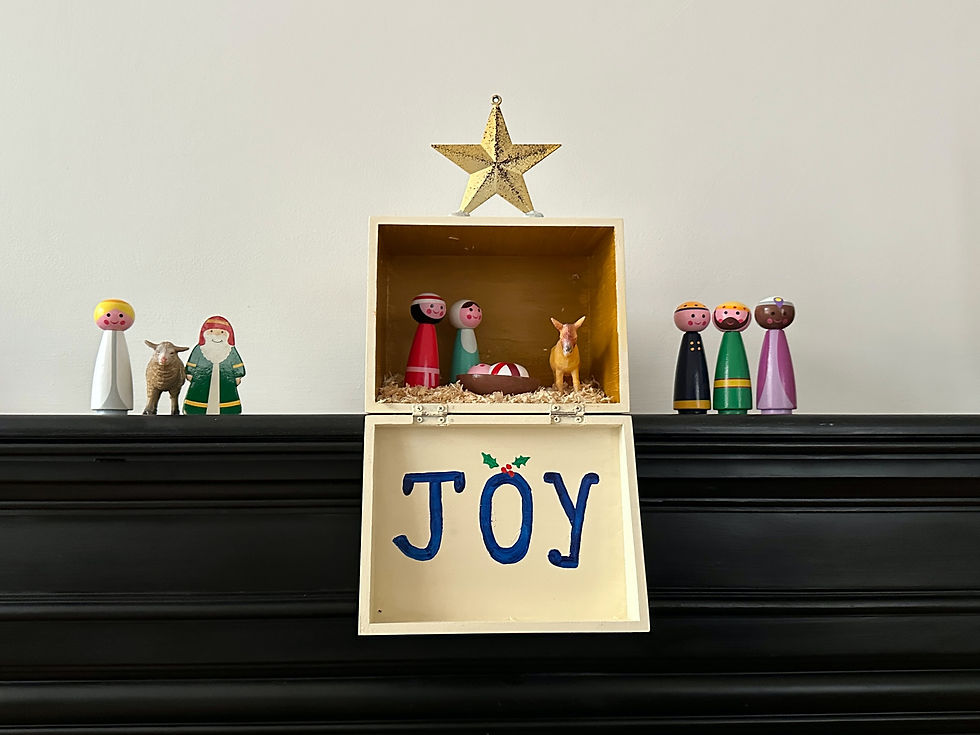Love Oneself
- Liz Collard Arnold

- Sep 5, 2025
- 7 min read
"Though our feelings come and go, God’s love for us does not."
– C.S. Lewis
In Matthew 22:37–40 (NIV), Jesus is asked which commandment is greatest. His response is profound: love God with all your heart, soul, and mind; love your neighbor as yourself. All the law and prophets, He said, hang on these commands.
We often talk about loving God. We know we are called to love our neighbor. But there’s a hidden piece tucked inside Jesus’s words—one we rarely acknowledge. To love our neighbor as ourselves, we must also love ourselves. Without this third part, the other two unravel.

Have you ever found it easier to forgive or extend kindness to someone else, while secretly despising yourself inside?
Loving ourselves isn’t about spoiling or indulging the flesh. It’s about choosing acceptance instead of self-hatred. It’s about believing that we are worthy of love because God Himself calls us beloved. For those of us who’ve lived through early rejection, this can feel almost impossible—but it is essential to healing.
A parent’s role is to love his/her child. When one doesn’t feel loved through a parent or caregiver, his/her understanding of love is distorted. There is an emptiness that needs to be filled.
I never felt worthy of anyone’s love. Instead, I tried to earn the love of others.
Derek Prince, author and Bible teacher, expressed in God’s Remedy for Rejection that, “a person who has never experienced being loved cannot transmit love.” He used 1 John 4:19 from the Bible—“we love because He first loved us”—as proof. Can we return God’s love or love other people if we don’t even love ourselves?
Part of loving oneself is giving yourself permission to feel all of our emotions.
In a 60 Minutes TV episode, renowned American researcher and author, Brené Brown, told CBS’s Bill Whitaker, “Let me tell you this for sure, and I know this from my life, I know this… from 20 years of research, and 400,000 pieces of data. If you don’t name what you’re feeling, if you don’t own the feelings, and feel them, they will eat you alive.”
Do you allow yourself to feel your emotions—or do you tend to push them aside, pretending they don’t exist?

To love ourselves we need to feel our emotions. I have heard many Christians say: “Don’t let yourself be controlled by your emotions.” Although I agree that we shouldn’t let our emotions run rampant, it doesn’t mean that we shouldn’t feel them.
God has emotions. If God has emotions, we have them too because we are made in His image (Genesis 1:26, NIV). God is sinless, so emotions can’t be bad because God is good! Of course, if our emotions lead us into sin, that’s different. However, God wants us to experience all of the emotions that He has created—especially His love.
When we suppress our emotions, it makes it difficult to process the pain from rejection and receive God’s love for us.
Scripture is full of examples, both in the Old and New Testament, of God expressing His emotions. In the story of Noah, we witness God’s regret and sorrow. In Genesis 6:5-6 (NIV), we read:
“The LORD saw how great the wickedness of the human race had become on the earth, and that every inclination of the thoughts of the human heart was only evil all the time. The LORD regretted that he had made human beings on the earth, and his heart was deeply troubled.”
In the Old Testament we read about God’s wrath at the Israelites for turning away from Him, and His great love for them when they returned.
We can see God’s empathy toward His people in Judges 2:18 (NIV). We learn that, “Whenever the Lord raised up judges for them, the Lord was with the judge, and he saved them from the hand of their enemies all the days of the judge. For the Lord was moved to pity by their groaning because of those who afflicted and oppressed them.”
In Jeremiah 32:41 (NIV), we read how happy God was when the Israelites returned to Him. God says, “I will rejoice over them to do them good and will faithfully plant them in this land with all My heart and with all My soul.”
God loves us with deep emotions and this is evident throughout history. Malachi, considered to be the last prophet before Jesus, gave one final profound message from God to the Israelites, “I have loved you,” (Malachi 1:1, [NIV]).
God loved His people even when they didn’t deserve it. Four hundred years passed before God demonstrated His love for all people, not just the chosen Israelites, by sending His own son, Jesus, to save us.

During Jesus’s time on earth, He also demonstrated a vast array of emotions.
When Jesus came upon the temple area in Jerusalem, He grew angry at the sight of people buying and selling because they had turned the holy house of prayer into a place of consumerism (Mark 11:15 - 17, [NIV]).
After learning of the death of John the Baptist, Jesus withdrew on a boat looking for solitude (Matthew 14:13, [NIV]).
When Mary and Martha came to Jesus to tell him that Lazareth was sick, we are told in verse five how Jesus, “loved Martha, her sister and Lazarus.” Later, in verse thirty-five, after Lazarus had died, Jesus wept, (John 11:5,35 [NIV]). The story of Lazarus’s death beautifully exemplifies how relational Jesus is.
Which of these moments speaks most to your heart—Jesus’s anger at injustice, His grief at loss, or His compassion for His friends?
If the Creator of heaven and earth and His son, Jesus, during His time on earth, demonstrated all of these emotions, so, too, can you and I! It’s essential to our physical, mental, emotional and spiritual health that we do.
If we can’t feel our emotions, we may struggle to feel anything at all, including God's love. We can’t fully love ourselves until we know, receive and feel God’s love.
The apostle Paul understood the significance of love. In his letter to the Corinthians, Paul states that, “no matter what I say, what I believe, and what I do, I’m bankrupt without love,” (1 Corinthians 13:7 [MSG]). We are all bankrupt without God’s love.

While talking to my daughter one day and questioning why she hears from God so clearly, and I don’t, she asked, “Mom, are you in love with Jesus?”
There was silence on my end. Her words landed like a stone in the still water of my heart.
“No,” I finally blurted out, “Not like before.”
When God first revealed Himself to me as a young adult, I was consumed by His love. I loved him unabashedly, fearlessly, and relentlessly. I was so in love with Him—I wrote poems to Him, sang His praises and spent copious amounts of time in His presence.
Can you remember a time when your love for God was fresh and alive—when you couldn’t get enough of Him?
Over the years, through pain and sin, my zeal eroded, not overnight, not quickly, but it did. I knew I needed to find my way back. I had to allow God to love me and love myself through the acceptance of His love. I needed to let God’s love burn in me the same way the power of the sun intensified by a magnifying glass can start a fire.

In her 2010 TED Talk, “The Power of Vulnerability,” Brené Brown comes to this conclusion, “Vulnerability is the core of shame, fear and our struggle for worthiness, but it’s also the birthplace of joy, of creativity, of belonging, of love.”
Congratulations, my friend! We have bravely exhibited our vulnerability as we openly navigated through the first part of this book. This vulnerability is now launching us away from rejection and into our destination—God’s love! Once we receive God’s love we will be able to love ourselves and others.
Prayer:
Father, I want to fully know your love, the love that only you can pour into my heart. Help me to understand the depths of your love. I desire to not just know your love, but to fully feel the intensity of it. It is my quest to fall in love with you all over again. Teach me about your perfect, steadfast, faithful and all-consuming love. Thank you for the love that can heal my wounds of rejection. Today I choose to receive your love and thus love myself. I open my heart to you. Continue to fill it with your divine love.
Application:
Do you need to fall in love with Jesus? I invite you to sit with God and ask Him to show you any area that you need to address before moving forward. Perhaps it’s still unforgiveness or anger towards someone. Or maybe you are struggling with a different symptom of early childhood rejection. Ask God to show you.
Journal prompt:
Write down what God revealed from the application. What is one way you can begin to love yourself?
Thank you for reading. If you’d like to support my writing pilgrimage
out of the trenches, will you consider buying me a coffee?
To read more about healing from early childhood rejection in this series, click on the links: Introduction, Distrust, Worthlessness, Loneliness, Depression, Hopelessness, Anxiety, Fear, Anger, Grief, and Unforgiveness
Endnotes:
Matthew 22:37-40 (NIV).
Derek Prince, God’s Remedy for Rejection. (Charlotte, NC: Whitaker House, 1993) 29.
1 John 4:19
60 Minutes, “Brené Brown on Vulnerability and Courage,” produced by CBS News, interview by Bill Whitaker, aired March 29, 2020, on CBS News, accessed May 31, 2023, https://www.cbsnews.com
Genesis 1:26 (NIV).
Genesis 6:5-6 (NIV).
Judges 2:18 (NIV).
Jeremiah 32:41 (NIV).
Malachi 1:1 (NIV).
Mark 11:15-17 (NIV).
Matthew 14:13 (NIV).
John 11:5,35 (NIV).
1 Corinthians 13:7 (MSG).
Brené Brown, “The Power of Vulnerability,” TED talks, June, 2010, video, 20:03, accessed May 31, 2023, https://www.ted.com/talks/brene_brown_the_power_of_vulnerability/transcript?language=en






Comments